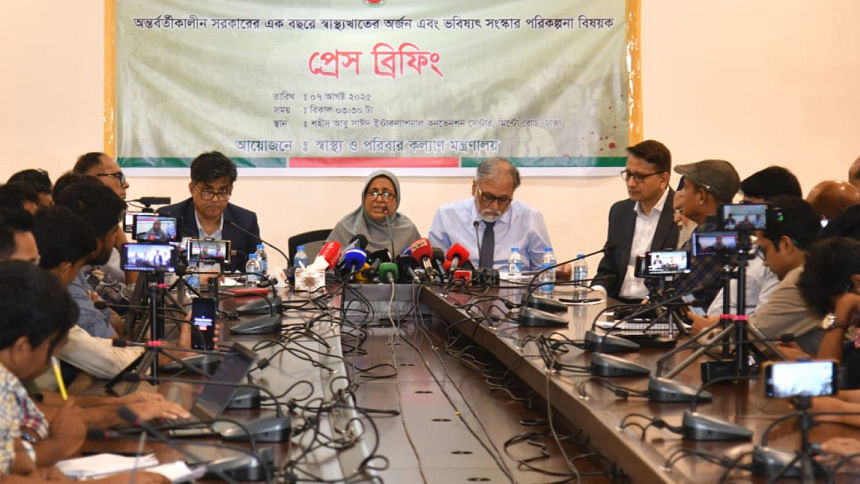10 ‘diseases’ plague the health system

The health ministry has identified 10 major "diseases" in the healthcare system and has taken or planned measures to address them, aiming to improve the country's overall healthcare.
If healthcare reform is not at the centre of planning, all other reforms will become meaningless, the ministry said yesterday.
We are undertaking various initiatives to bring positive changes to the country's health sector. We hope the benefits of these efforts will become visible in the coming days.
"We promise that change is coming and reforms have already begun," said Prof Sayedur Rahman, special assistant to the chief adviser for the health ministry.
Health Adviser Nurjahan Begum said, "We are undertaking various initiatives to bring positive changes to the country's health sector. We hope the benefits of these efforts will become visible in the coming days."
They were speaking at a press conference held at the Shaheed Abu Sayed International Convention Centre in the capital to highlight the ministry's achievements over the past year and outline future reform plans.
Prof Sayedur said they have identified 10 major problems in the health system, describing them as "diseases".
These are the absence of merit, knowledge, and competence in the system; excessive centralisation; overreliance on specialised treatment and neglected primary healthcare; lack of transparency and a culture of impunity; unmotivated and demoralised healthcare providers; absence of critical thinking and proper mindset; erosion of ethics and conflicts of interest; overdependence on external actors; weak leadership and poor management; and severe lack of planning, resource allocation, and consistency.
He said the ministry has already taken some steps and planned further measures to tackle these issues.
They have repealed the quota system in medical admissions and set up an accreditation council, he continued.
Among other measures, the ministry has proposed an automated posting system, a separate public service commission for the health sector, and either the closure or quality improvement of low-standard medical colleges.
They have also taken steps to decentralise the power of various directorates under the ministry, said Prof Sayedur.
New institutions have also been planned, including a National Institute for Women in Khulna, a Geriatric Health Institute in Chattogram, and a health city in Rangpur.
To strengthen primary healthcare, ward-based primary healthcare centres will be established in urban areas, while existing union-level health and family planning centres will be turned into full-fledged primary healthcare centres. A total of 2,700 doctors will be appointed to provide primary healthcare, he also said.
Patients referred from these centres will be treated by specialists at upazila and district hospital outpatient departments.
To ensure transparency and accountability, they are planning to introduce a unique Health ID, and all procurement will be carried out through the e-GP system.
The ministry has proposed a special pay board for healthcare workers and an 18-month internship for doctors, up from the current 12 months. The internship will include six months of outdoor or community-based primary healthcare services.
Pharmaceutical companies, diagnostic centres, and private hospitals will not be allowed to offer gifts or commissions to doctors, he added.
Two separate councils will be established to resolve conflicts of interest. The capacity of the government-run Essential Drug Company Ltd will be expanded to reduce dependency on external suppliers.
The Bangladesh Institute of Health Management will be operationalised to develop competent leadership. A needs assessment will also be carried out for manpower planning in the sector, said Prof Sayedur.
When a reporter asked for their response to a health sector reform commission member's recent remark that the ministry was in an "utter mess", Prof Sayedur said, "We don't want to comment on that. You can make your own judgment… We tried to improve the situation…"
In response to the Bangladesh Association of Pharmaceutical Industries' (BAPI) claim that the government is putting the pharmaceutical sector at risk, he said no pharmaceutical company has faced an existential crisis during their tenure.
"I'm not sure why they're saying this. We have to strike a balance -- ensuring citizens' access to affordable and quality medicines, while also allowing a fair and reasonable profit margin," he said.
Nurjahan said one of their top priorities is to ensure proper treatment for those injured in the July uprising. In addition to treatment within the country, 78 individuals were sent abroad for better care.
The government has decided to promote 7,000 officials and has already promoted some of them, addressing long-pending promotion issues, she also said.
The prices of coronary stents and anti-cancer drugs have been reduced, and existing laws have been amended to facilitate organ donation, she added.
Top ministry officials were also present at the briefing.

 For all latest news, follow The Daily Star's Google News channel.
For all latest news, follow The Daily Star's Google News channel. 



Comments